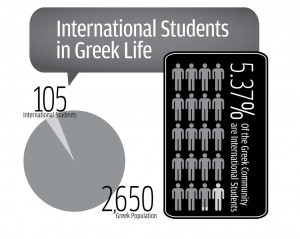Foreign students underrepresented in Greek system
Although USC boasts a vibrant Greek community, only a small portion of the Greek system is comprised of international students.
Of the 1,833 undergraduate international students at USC, only 105 were involved in the Greek system last year, according to Beth Saul, assistant dean of student affairs and director for Office of Fraternity and Sorority Leadership and Parent Programs.
Overall more than 2,600 out of the nearly 17,000 undergraduate students at USC were involved in Greek life last year.
An international student at USC is therefore three times less likely to join a fraternity or sorority at USC than an American student.
“We are making efforts to reach out to international students that want to go Greek,” Saul said.
Although the number of international students involved in Greek life is proportionately small, Saul notes the number of international students joining the Greek system at USC is increasing yearly.
Compared to the 2008-2009 academic year, the number of international students involved in Greek life rose 7 percent during the 2010-2011 academic year, according to Saul.
The Greek community has made a concerted effort in the past few years to reach out to international students especially during international student orientation.
“We had a Greek life info session during international orientation session last year and it was very successful, so we decided to have one again this year,”
Saul said.
Some students, however, including Alexander Silkin, a junior from Russia majoring in computer science and a member of the Sigma Phi Epsilon fraternity, found the Greek life session during international student orientation discouraging.
“For international students, at one time during orientation there was a one-hour seminar and I just decided to go to the Greek seminar,” Silkin said. “It wasn’t particularly helpful, so I think that really turns people off.”
Raymond Carlos, the associate director of the Office for Fraternity and Sorority Leadership, notes the low number of international students involved in Greek life can be attributed to people’s association with the word “Greek.”
“The fact that we call it Greek life may just sound different to other people,” Carlos said. “People may not be familiar with what we mean by Greek.”
Silkin, who lived for several years in Hong Kong, concurs with this analysis, noting that the Greek system is a foreign concept for many Asians.
“Even though I basically lived in Hong Kong, even though it’s Asia, it’s very western so it wasn’t hard for me to adjust, but I think people coming straight from Asia would find it hard to fit [into the Greek system],” Silkin said.
As an American citizen who grew up in London, Christopher McMahon, a junior majoring in business and cinematic arts, understands how international students are not culturally aware of Greek life.
“I can see why there isn’t much of an international population, just because it’s a strange concept,” McMahon said. “There really isn’t a good way to understand what [fraternities and sororities] are if you’re not brought up knowing what they are.”
McMahon said he believes the best way to increase the international population in the Greek system is through word of mouth.
“Once you get more [international students] into the system, they start talking to their friends and other peers that are overseas, then you get that rollover effect, that initial push,” McMahon said.
Chloe Stepney contributed to this
article.


What exactly is “underrepresented”? The percentages don’t match up between the Greek community and the general USC community. OK, so what? That’s how the world works. Pick two groups of people, compare them with some criteria, analyze the differences. Doesn’t mean anything. CORRELATION DOESN”T EQUAL CAUSATION.
Foreign students are foreign, thus have no idea of what Greek life even is, as noted in the article.
Keep on slandering the Greek community, Daily Trojan! Sorry Greek life isn’t for you, but stop trying to impose your viewpoints on everyone else. Thanks.
ATO took a whole bunch of Euro trash last year only to have them leave after one year.
What’s “Euro trash?” please define it.
A human sub-phylum characterized by its apparent affluence, worldliness, social affectation and addiction to fashion. Males are characterized by a semi-slovenly appearance (including half-shaven faces), greasy hair, rib-hugging shirts, tight jeans and loafers worn without socks. Women are easily distinguished by anorexia, over-bleached hair, gaudy jewelry, plastic surgery (particularly breast-enlargement) and their attachment to the male species. Both sexes greet each other with “air kisses,” immediately speak of their last trip (often Paris, Rome, Majorca), spend hours at “see-and-be-seen” restaurants and exhibit a world-weariness and pained sense of iron
Or Simply find yourself a mirror
That kind of attitude is what discourages many people from joining the Greek system (both American and international). Greek life is a way for Americans to continue their American high school experience, full of drama and pointless popularity contests, something many international kids either did not experience before or would not want to repeat again.